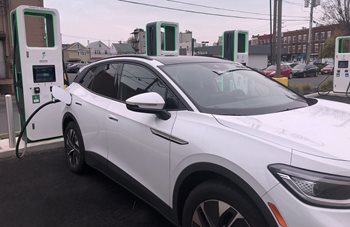 For potential electric car buyers, 2022 could be an “exciting year,” with new vehicles providing “lots of variety and choices” and new laws expanding incentives and making charging more convenient, according to Pamela Frank, CEO, ChargEVC-NJ, who briefed the NJTPA Board at its January meeting.
For potential electric car buyers, 2022 could be an “exciting year,” with new vehicles providing “lots of variety and choices” and new laws expanding incentives and making charging more convenient, according to Pamela Frank, CEO, ChargEVC-NJ, who briefed the NJTPA Board at its January meeting.
Frank said the non-profit ChargEVC-NJ was formed in 2016 to include a “chorus” of electric vehicle stakeholders—car buyers, environmentalists, manufacturers and auto dealerships—seeking to advance the market for the vehicles. At the time, the market in the state was relatively weak, with few buying incentives or other support programs.
The market, she said, got a big boost in 2020 with the enactment of new state laws. In addition to buying incentives, state law now supports the creation of a statewide network of public charging stations. The goal is to have public fast chargers available every 25-30 miles along the 42 roadways in the state that carry 80 percent of miles driven, she said
Most recently, she noted, the state has adopted California goals for clean trucks, which will support increasing numbers of electric trucks operating in New Jersey each year. At the same time, the new federal infrastructure law expands tax credits by thousands of dollars for vehicle purchases and supports nationwide charging infrastructure.
Car makers, meanwhile, are investing billions in factories, batteries and vehicle designs. “Seems like every week there’s another announcement” of a new electric vehicle model being brought to market, she said. “And it’s continuing.”
Consumer demand is growing too she said, though she said it may take a few months to address supply chain issues which now limit vehicle availability in the state. She said electric vehicle purchases often occur in clusters, driven by local social networks. “Once one neighbor gets one, the whole neighborhood starts to pick up on this,” she said.
The vehicles are an increasingly a practical choice, she said, with a number of charging options including at-home garage charging and public fast charging depots, where typically it takes 20 minutes to achieve an 80 percent vehicle charge. She noted that this is more than adequate since most trips are less than 40 miles and battery range is often around 300 miles.
She urged the county representatives to consider electric vehicles for their fleets and to assist municipalities in adopting them. Cost savings are one important reason. In her own case, she said a conventional vehicle would cost her about $10,000 a year to fuel. In contrast, her battery electric vehicle charged overnight in her garage costs only $800 per year.
She said county and local governments should begin now to plan electric vehicle adoption to they can “leverage some really attractive incentives that we expect in the market.” The presentation can be viewed on YouTube.
NJTPA has compiled electric vehicle resources to assist municipalities and counties with implementation. They can be viewed at njtpa.org/ev.